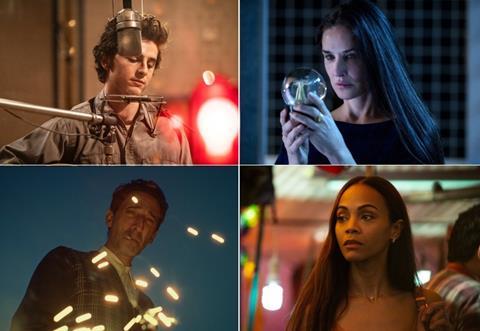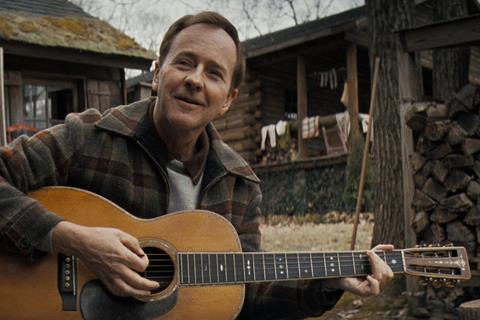The Bafta Film Awards and Oscars remain too close to call across multiple categories. Screen International’s UK awards team discuss who has the edge to win the major prizes.

Last year’s Bafta and Oscars film awards season proved to be one of the more predictable in recentmemory. By the start of January, it had become clear that Oppenheimer was emerging as the runaway favourite to scoop the best film/best picture awards from the two big film academies, as well as to effect a sizeable sweep in other categories.
In 2025, not so much. As we head into the final days of voting at Bafta (ends February 11) and into the Oscar voting window (February 11-18), few would disagree the field remains wide open in almost every category. In conversations with voters and interested parties, Screen International has rarely experienced so much disagreement about not only what should win, but also about what will win.
Our UK awards team came together to disagree agreeably about who might triumph at both the Baftas and the Oscars — at the respective ceremonies on February 16 and March 2. Let the punditry commence…
Best film and director
Charles Gant Awards issues editor: At the beginning of the season, people were talking about the ‘A-B-C-D-E’ films, by which they meant Anora, The Brutalist, Conclave, Dune: Part Two and Emilia Pérez. Then over the course of the season, Dune: Part Two dipped down and A Complete Unknown — which, to be fair, was a complete unknown to everyone at the start of the season — came in and became one of the top five. Those are Bafta’s best film nominees.
Finn Halligan Executive editor, reviews and new talent: Indeed. But dropping Dune: Part Two to have A Complete Unknown in the top five hasn’t made any difference to the number of films from female directors nominated for best film at Bafta, which is sadly zero.
Matt Mueller Editor-in-chief: Even now, it does feel like a very wide-open race. Anora felt like the film everyone was talking about coming out of Cannes, but could it sustain that all the way to the podiums? And clearly, Emilia Pérez has a lot of supporters. But then The Brutalist came out of Venice, and Conclave seems to have gathered a lot of heat, based on being perhaps the film with the broadest appeal.
Gant: Emilia Pérez having the most Oscar nominations, with 13, might suggest it’s the front-runner to win best picture, but is that really the case? Whereas at Bafta, Conclave is the most nominated film with 12… and I can see it doing very well.
Louise Tutt Deputy editor: I would agree with you about Conclave at Bafta, had it been shot in the UK with a big UK crew. But it wasn’t, it was shot in Italy. Conclave might win outstanding British film, but I think Bafta will come down for The Brutalist in best film. It feels like there is a crescendo building around it in terms of voters and what people are really saying they love.
Halligan: Conclave is very solid entertainment, on a mature level, as is A Complete Unknown. So they are easy wins when it comes to nominations, but it’s hard to know how they’ll convert. I agree that The Brutalist is gaining momentum as the film lovers’ film. But Bafta voters love Edward Berger — Conclave is his second film to sweep the nominations after All Quiet On The Western Front two years ago.
Tutt: Bafta didn’t nominate James Mangold for best director, which could say something about A Complete Unknown in best film.
Mueller: Looking at the Oscar best picture list of 10 films, and at the five titles that weren’t nominated for Bafta in best film, do any of those have a chance to win best picture? For example, Dune: Part Two and Wicked. There’s a lot of support for Wicked — a big Hollywood film, hugely successful. That can generate a lot of goodwill with Ampas voters, who are more part of that big studio-driven industry.
Gant: The lack of a screenplay nomination is a concern for Wicked. Titanic and The Sound Of Music are very rare examples of films winning best picture while lacking a screenplay nomination.
Mueller: The Brutalist also has that cineaste seal of approval. It’s become the must-see visionary masterpiece by Brady Corbet, which could give him the edge in best director?
Halligan :If you look at what was achieved, The Brutalist is standing way out in terms of scope and difficulty, low budget and ambition.
Tutt: I would love Coralie Fargeat to win, but The Substance is quite a divisive film. It’s great that she does have the Bafta nomination, but it’s just incredibly poor that there aren’t more female directors alongside her. It would be a big upset if she won best director.
Gant: It feels refreshing that Oscar has five first-time director nominees. James Mangold has been nominated before for screenplay and best picture, but not director. The last time we had all first-time director nominees was 1998, the year of Titanic.
Outstanding British film
Tutt: It’s a good list. Apart from perhaps Gladiator II, there are none that raise an eyebrow with me about their Britishness. There’s a great cross-section of films, and several directed by women in Lee, The Outrun, Bird and Love Lies Bleeding. And although Conclave could be a strong contender for the outstanding British film Bafta, this might be the award that Kneecap — which has six nominations — wins.

Mueller: The love for Kneecap could convert in this category, with probably Conclave being its main rival.
Halligan: Come on, Wallace & Gromit: Vengeance Most Fowl — one of my favourite films of the year.
Gant: Vengeance Most Fowl could very plausibly win three Baftas. It’s nominated for children’s and family film, which is a juried category, plus animated film and also here — that would be an amazing hat-trick to score on the night.
Leading actor and actress
Mueller: With leading actor, it felt like the front-runner for a long time was The Brutalist’s Adrien Brody. I wonder now whether Timothée Chalamet is making a late charge in A Complete Unknown?
Halligan: The problem is, Timothée is so young. Voters may think, “Oh, we’ll get another chance to vote for him.” We saw that happen with Leonardo DiCaprio, who finally won with his sixth nomination (The Revenant). But Timothée is certainly deserving — you take on Bob Dylan, and the Bob Dylan purists love you. Come on, how hard is that?
Gant: Youthful Austin Butler won the best actor Bafta for Elvis two years ago, beating eventual Oscar winner Brendan Fraser in The Whale. History could repeat. But what about Ralph Fiennes for Conclave, particularly at Bafta? His only Bafta win was in supporting actor for Schindler’s List. He’s never won for leading actor, and this is his fifth nomination in the category. What he does in Conclave is so subtle — it’s all acting inside his brain and revealing it through his face.
Tutt: At Bafta, Ralph Fiennes does have home advantage. There are a lot of Bafta voters who would have worked with him, and I think he’s pretty well-liked.
Mueller: If Adrien Brody wins, he’ll be two for two at Oscar. He’s only been nominated once before, for The Pianist, and he won. But might he be hurt by the revelation that some of his Hungarian accent was smoothed out by AI?
Tutt: I wouldn’t think so at Bafta, maybe Oscar.
Gant: For me, it’s a tempest in a teacup. Nobody’s been hurt by the use of technology. It’s not been used instead of a performance, but to augment, just like CGI is used to augment. I’m struggling to see how this is something we need to be concerned about.
Mueller: Just to play devil’s advocate, you could take the opposite view — that performing an accent expertly can be a factor in awards. Look at Meryl Streep — it was considered one of the most extraordinary things about her ability as an actress. If an actor can now just call on AI to deal with accent issues, does that change the nature of performance? I’m not dissing Adrien Brody, I love his performance in this film, but if this technology is available, does it raise issues for how performances are judged?
Tutt: Dick Van Dyke would have been completely different in Mary Poppins. Where was AI when we needed it?
Mueller: For leading actress, Demi Moore is in a very strong position to win both Bafta and Oscar. But Cynthia Erivo for Wicked is a strong contender as well. I also feel there’s growing support for Fernanda Torres in I’m Still Here. She could pull off quite the upset with Oscar voters.
Halligan: I am completely torn between Demi and Cynthia — both would be great wins. With Demi, there’s more than just the performance — it’s also her gutsiness and taking it on. Although it’s the same for Cynthia, who then proves this amazing voice talent.
Tutt: I reckon it’s Demi all the way. Her backstory, beating the odds in Hollywood, and this being a personal story for her. I would not be surprised if this is the category The Substance wins at Bafta and Oscar. If voters choose one category to support the film, this would surely be it.
Supporting actor and actress

Mueller: For a long time, supporting actor looked sewn up. People have been talking about Kieran Culkin in A Real Pain since Sundance 2024, and that wave has been ridden all the way to now. He’s won critics awards, the Golden Globe… But I wonder if, now that people are really watching all the films, might A Complete Unknown’s Edward Norton pull a surprise, or Yura Borisov for Anora? Those are the two that might challenge Kieran for his crown.
Gant: In both of the supporting categories, with Kieran Culkin and also Zoe Saldaña for Emilia Pérez, it felt for a long time those two were quite far ahead. I agree it feels a lot closer than we thought it was a month ago.
Tutt: I love Edward Norton in A Complete Unknown. He’s the heart and soul of that film.
Mueller: He might be the one to challenge Kieran, who is brilliant in A Real Pain, but also is a little bit sliced from the same loaf of bread in terms of his performance in Succession. Variations on a theme. But isn’t variations on a theme kind of true of all actors, ultimately?
Halligan: This category is where you see actors who make the most of their roles. The roles are well-written, but maybe some less than others. Guy Pearce in The Brutalist — he makes a lot of it. Jeremy Strong as Roy Cohn — he’s fantastic. This is a showcase for what a good actor can do with a supporting role.
Gant: It’s incredible to think Guy Pearce has never been nominated before — for movies like Memento and LA Confidential. There are a lot of first-time Oscar nominees this year: 13 of the 20 for acting categories. It’s great to see so many people getting long-overdue recognition or bursting forth in fantastic work and landing a nomination.
Mueller: In supporting actress, there is a very strong front-runner, but I feel she’s in the wrong category: Zoe Saldaña for Emilia Pérez should be in leading actress. She has probably more screen time than Karla Sofia Gascon, but she was slotted into this category to give them both more of a chance to be nominated. For fans of this film, this feels like a category they can rally around.
Halligan: And Zoe Saldaña’s part makes the film. She gives it the basis for Karla Sofia Gascon to then turn in her performance. It rests on Zoe. The Isabella Rossellini part is so small in Conclave that it’s delightful that it made its way through to voters. It’s another example of a very experienced, good actor doing an awful lot with very little.
Tutt: I’m glad to see The Last Showgirl nominated via Jamie Lee Curtis at Bafta, but I lament the absence of Pamela Anderson in leading actress. Pamela’s performance was so subtle and nuanced.
Gant: I genuinely do not know who I’m going to vote for in this category, but I’m going to throw a shout-out for Ariana Grande. I did love her performance — I thought it was slyly funny and charming. Could you imagine Wicked without her? I couldn’t.
Film not in the English language
Mueller: At Bafta, there are three crossover films with Oscar’s international feature category — Emilia Pérez, I’m Still Here and The Seed Of The Sacred Fig — plus Kneecap and Payal Kapadia’s All We Imagine As Light. It’s a tough call, and could go in many different directions. Kneecap could win outstanding British film at Bafta, and therefore people might put their votes to another film in this category. All We Imagine As Light is a lot of critics’ favourite. Emilia Pérez — if people don’t vote for it in other categories, here is the chance to support it. And I’m Still Here — this is the only chance to vote for it at the Baftas.
Halligan: I love the fact Magnus von Horn’s The Girl With The Needle, which is one of the darkest films I saw last year — I mean, that film is twisted, and it’s brilliant — has won an Oscar nomination. That’s something I didn’t predict when I saw it at Cannes. With the nominations also for The Substance and Nosferatu, we are seeing a willingness from voters to go dark.
Tutt: Kneecap is the one that’s missing at the Oscars, and yet it’s so exuberant and joyful. I wonder if Oscar voters just didn’t watch it, unsure of what the title meant.
Gant: Maybe the Oscar voters that participate in international feature like more-traditional arthouse foreign-language dramas, and Kneecap just wasn’t going to fly. At Bafta, you get a lot more people opting in. And now picking the winner, everyone gets to vote, and that could play in favour of Kneecap. But it does feel like Emilia Pérez should win the Bafta and Oscar, just by virtue of being the film that has attracted broad support across multiple categories at both awards.

























No comments yet